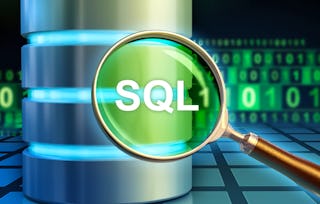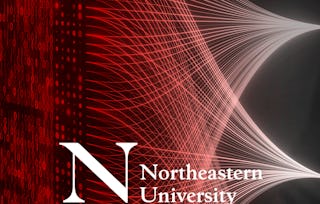In the Data-Driven Systems: DBMS, SQL & Data Modeling course, you will gain an essential foundation in database theory and skills, exploring key concepts and architecture within a data-centric system context. You will acquire valuable knowledge and skills in managing, manipulating, and analyzing large datasets, with an emphasis on both relational and NoSQL databases.

Data-Driven Systems: DBMS, SQL & Data Modeling

Skills you'll gain
- Data Integrity
- Database Design
- NoSQL
- Databases
- Data Modeling
- MongoDB
- Database Management Systems
- Relational Databases
- Database Architecture and Administration
- Performance Tuning
- Conceptual Design
- Software Architecture
- Database Theory
- SQL
- Unified Modeling Language
- Diagram Design
- Database Development
- Skills section collapsed. Showing 10 of 17 skills.
Details to know

Add to your LinkedIn profile
14 assignments
See how employees at top companies are mastering in-demand skills

There are 4 modules in this course
In Module 1, you will embark on a journey through the history and evolution of database systems, gaining valuable insights into the milestones that have shaped modern data management. Through critical analysis of historical contexts and past design strategies, you will develop a nuanced understanding of how database designs have progressed and occasionally faltered. We will evaluate the impact of these developments on current database practices and learn to apply this knowledge to assess and enhance database effectiveness.
What's included
4 videos19 readings4 assignments1 discussion prompt
In Module 2, you will explore the intricacies of database modeling, learning to articulate and refine models using established and emerging methodologies. This module aims to equip you with a solid understanding of fundamental modeling concepts, the skills to use UML and Crow’s Foot notations effectively, and the ability to perform and critically analyze Entity Relationship Models. By exploring the principles and components of various data models, you will enhance your ability to develop robust database structures tailored to specific requirements.
What's included
2 videos15 readings6 assignments
In Module 3 you will explore the crucial phases of the database development life cycle, delving deep into the theory and practice of database normalization. This section is designed to enhance your proficiency in developing streamlined and efficient database structures, aligning with industry best practices. Through a comprehensive survey and analysis, you will gain insights into how databases fit within software architectures and the importance of each development stage.
What's included
1 video11 readings2 assignments1 discussion prompt
In Module 4 you will focus on advanced database techniques, with a special emphasis on MongoDB. You will learn about the critical role of normalization in optimizing database design for performance and scalability. Additionally, this part will cover advanced concepts such as document-oriented databases, indexing strategies, and performance tuning, providing you with the skills to implement and manage robust database solutions using MongoDB.
What's included
1 video12 readings2 assignments
Instructor

Offered by
Explore more from Data Management
 Status: Preview
Status: PreviewIllinois Tech
 Status: Free Trial
Status: Free Trial Status: Preview
Status: PreviewNortheastern University
Why people choose Coursera for their career

Felipe M.

Jennifer J.

Larry W.

Chaitanya A.

Open new doors with Coursera Plus
Unlimited access to 10,000+ world-class courses, hands-on projects, and job-ready certificate programs - all included in your subscription
Advance your career with an online degree
Earn a degree from world-class universities - 100% online
Join over 3,400 global companies that choose Coursera for Business
Upskill your employees to excel in the digital economy
Frequently asked questions
To access the course materials, assignments and to earn a Certificate, you will need to purchase the Certificate experience when you enroll in a course. You can try a Free Trial instead, or apply for Financial Aid. The course may offer 'Full Course, No Certificate' instead. This option lets you see all course materials, submit required assessments, and get a final grade. This also means that you will not be able to purchase a Certificate experience.
When you purchase a Certificate you get access to all course materials, including graded assignments. Upon completing the course, your electronic Certificate will be added to your Accomplishments page - from there, you can print your Certificate or add it to your LinkedIn profile.
Yes. In select learning programs, you can apply for financial aid or a scholarship if you can’t afford the enrollment fee. If fin aid or scholarship is available for your learning program selection, you’ll find a link to apply on the description page.
More questions
Financial aid available,


